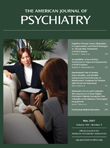To The Editor: Drs. Erickson and Erickson are concerned about the costs to the public resulting from the downturn in support of NIH funding. As we enter the fourth consecutive year of subinflationary budgets for NIH institutes, we see the pain in many sectors of the biomedical research community, from new investigators applying for a first grant to senior scientists who are losing long-term support for a productive laboratory. The gap between supply and demand has become even more acute in the past year as success rates for most NIH institutes have fallen below 20%. To adapt to the decrease in funding in the current fiscal year, NIH has adopted several new pay policies designed to protect scientists who are most vulnerable (http://grants.nih.gov/grants/guide/notice-files/NOT-OD-07-030.html).
Each of the 27 institutes and centers at NIH faces somewhat different funding challenges. NIMH has had one of the highest investments in training, approaching twice the NIH mean. While success rates for research grants were falling from close to 30% to under 20%, NIMH support for training was growing at an unsustainable rate. Left unchecked, this imbalance between the pipeline and the payline would ultimately ensure that the Institute would not be able to support independent research by the generation of young investigators currently in training. To correct this imbalance, in 2004 NIMH initiated a plan to reduce the number of institutional training (T) grants and the number of mentored career (K) awards, with a goal of changing the training commitment from 10.5% to 8.6% of the total budget by 2010. From 2004 to 2006, the total number of mentored K awards dropped from 379 to 362. This is not exactly a “drastic” reduction, but it may feel draconian to a new applicant who finds that a grant with an excellent score is not funded. While there have been many excellent K awards that were not funded, 54 new mentored K awards were funded in 2006, ranging from basic neuroscience to services research. Moreover, the NIMH success rate for mentored K awards in 2006 was 27%, well above the success rate for research grants at NIMH. Note that last year the National Institute on Drug Abuse funded a total of 142 mentored K awards, and the National Institute on Alcohol Abuse and Alcoholism funded 58 mentored K awards, marking an increase in support and success rates well above success rates for research grants.
Drs. Erickson and Erickson are correct to note the importance of these awards for providing protected time for research training. Our challenge is to balance the funds committed to training with the funds available for research grants, ensuring that those in the pipeline will have an opportunity to become independent investigators. More than ever, as our special article noted, the current budget requires tough choices and careful planning. Drs. Erickson and Erickson remind us that these tough choices can create a new set of costs to the public.

